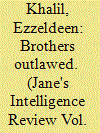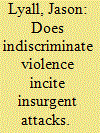| Srl | Item |
| 1 |
ID:
129514


|
|
|
| 2 |
ID:
088414


|
|
|
|
|
| Publication |
2009.
|
| Summary/Abstract |
Does a state's use of indiscriminate violence incite insurgent attacks? To date, most existing theories and empirical studies have concluded that such violence is highly counterproductive because it creates new grievances while forcing victims to seek security, if not safety, in rebel arms. This proposition is tested using Russian artillery fire in Chechnya (2000 to 2005) to estimate indiscriminate violence's effect on subsequent patterns of insurgent attacks across matched pairs of similar shelled and nonshelled villages. The findings are counterintuitive. Shelled villages experience a 24 percent reduction in posttreatment mean insurgent attacks relative to control villages. In addition, commonly cited "triggers" for insurgent retaliation, including the lethality and destructiveness of indiscriminate violence, are either negatively correlated with insurgent attacks or statistically insignificant.
|
|
|
|
|
|
|
|
|
|
|
|
|
|
|
|
| 3 |
ID:
188028


|
|
|
|
|
| Summary/Abstract |
Electoral politics and violent civil conflict often coexist. Citizens exposed and unexposed to violence bear the costs of conflict unevenly and, thus, conceive of militant vs. accommodationist state response to the perpetrators of violence differently. The literature has found that victims of political violence tend to endorse militant state response against nonstate actors seen as responsible. This result is mostly based on secessionist conflicts in which victims of violence are often shielded from the costs of state counterinsurgency or counterterrorism campaigns. By contrast, we argue, in non-secessionist conflicts, individuals exposed to violence tend to also experience the state militant anti-guerrilla operations, which often lead to state abuses of civilians. We expect that civilians exposed to nonstate and state attacks will be more likely to support pro-peace policies. We find support for this argument analyzing Colombia’s 2014 presidential election and 2016 peace agreement referendum. In addition, we use original data on local candidates’ pro- and anti-peace process positions in Colombia’s 2014 congressional election to test the underlying logic of the argument that local communities exposed to both nonstate and state violence are more likely to demand pro-peace policies.
|
|
|
|
|
|
|
|
|
|
|
|
|
|
|
|